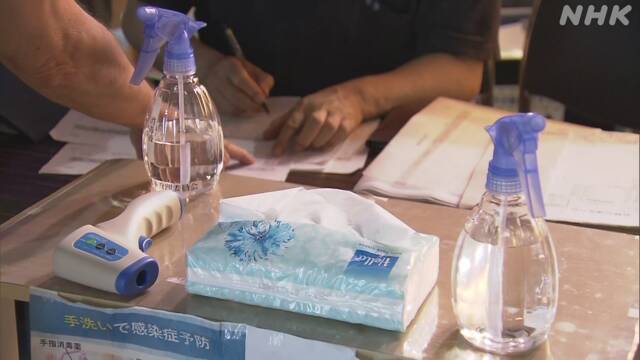Precautions for living in an evacuation center First of all, hygiene management Frequently disinfecting by corona measures 18:28 on July 5th
There is a concern that evacuation lives will be prolonged in the affected areas of Kumamoto Prefecture. We asked Professor Sakiko Kambara of Kochi Prefectural University, who is familiar with the living environment of evacuation centers, regarding points to note.
First, hygiene management Drop mud and disinfect frequently
First and foremost is hygiene management at evacuation centers. In the case of water damage, shoes and clothes are easily covered with mud, so be sure to take off your shoes when entering an evacuation center, and if there is dirt on your clothes, wipe it off with a wet tissue.
It may be difficult to wash your hands frequently with the water being cut off, but it is important to disinfect it frequently with alcohol disinfectant etc. in consideration of new coronavirus measures.
Physical condition management Water replenishment Physical activity meal balance
Physical condition management requires attention. According to Professor Kamihara, in evacuation shelters, it is important to drink water regularly, exercise appropriately, and have a well-balanced diet so as not to concentrate on bread and rice balls.
If immunity is compromised, the risk of infection with the new coronavirus increases.
Especially, elderly people tend to stay still more often, so I would like you to try to talk with each other and exercise together.
Also, because there is a tendency that many people have refrained from going to the hospital due to anxiety about infection with the new coronavirus, I would like you to speak up if you feel any abnormality in your physical condition.
Stay overnight in a car with distributed evacuation Beware of economy class syndrome
When Professor Kamihara talked to nurses and others working in the disaster areas of Kumamoto, it is said that there are many cases where she lives in a decentralized way to avoid evacuation centers.
In particular, many people evacuate while staying in a car, making it difficult for evacuees to know where they are and how they are physically feeling.
If you are staying in the car overnight, it is recommended that you drink plenty of water and do not put up with the toilet, and regularly go out of the car and move around to prevent economy class syndrome.
Volunteers are alert from the new Corona
Professor Kamihara says that support activities from volunteers in the disaster-stricken areas should first be given priority to support from nearby areas such as around Kyushu.
Professor Kamihara said, ``Entering a disaster-stricken area where there are few people infected with the new coronavirus, such as Tokyo, increases the risk of infection in the disaster-stricken area, so it should be avoided at this time. I was talking."
On the other hand, at the evacuation shelter in the case of a heavy rain in western Japan two years ago, there was a strong need for changing clothes such as towels and T-shirts, canned foods that were not carbohydrates, and oral rehydration solution. I want you to think about it.

